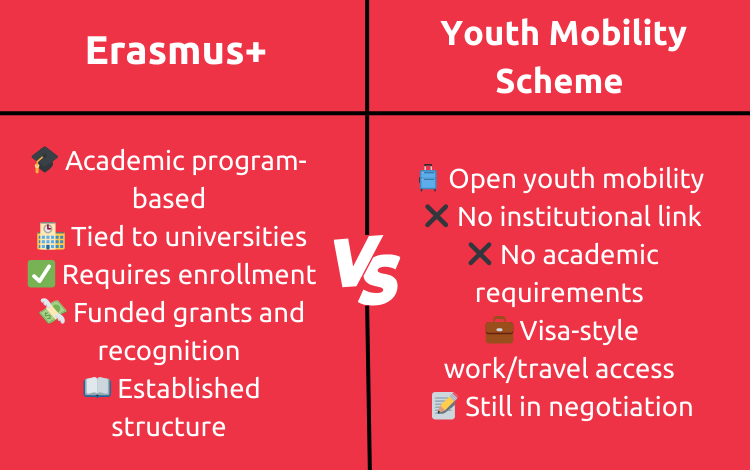UK leaders have agreed to a landmark deal with the EU that will see the reintroduction of Erasmus+, alongside the establishment of a youth mobility scheme.
These developments come amid a sharp decline in EU students attending UK universities since Brexit. In the 2015–16 academic year, over 127,000 European students were enrolled at UK institutions, by 2023–24 that figure had dropped to just over 75,000.
According to experts, this decline has been a strategic loss for the UK on several fronts: a significant drop in tuition revenue, a less internationally diverse student population, and reduced access to young international talent.
Rejoining Erasmus+ and introducing a youth mobility scheme are seen as key steps toward reversing these trends and making the UK more accessible and attractive to students across Europe.
What does Erasmus+ mean for business school students?
Erasmus+ is an EU-funded program that supports students in studying, training, or gaining professional experience abroad. It establishes structured partnerships between UK and EU academic institutions, such as universities and business schools, with built-in financial support.
This allows UK and EU students to remain enrolled at their home school, take courses abroad that count toward their degree, avoid extra tuition fees at the host institution, and receive a monthly Erasmus+ grant to help cover living expenses.
Students can also participate in internships, with schools assisting in connecting them to companies abroad. These internships are typically pre-approved, count toward degree requirements, and come with financial support for living costs.
Overall, Erasmus+ makes studying and working abroad more accessible for b-school students, removing barriers to gaining international experience.
Additionally, it offers business students exposure to new markets and business cultures, along with the opportunity to learn a new language—key assets in today’s global business environment.
What does a youth mobility scheme mean for business school students?
The newly proposed youth mobility scheme is broader and more flexible than Erasmus+. It is designed to allow UK and EU citizens aged 18 to 30 to live, work, and study abroad for up to four years.
The commission agreed that the new scheme would not be ‘purpose-bound,’ meaning that, unlike Erasmus, it would not be tied to a specific institution. This allows people benefiting from the agreement to undertake various activities within the limited time period, including studying, training, working, and traveling.
The UK already has a youth mobility visa, which is open to people from 12 different countries, including Australia, New Zealand, South Korea, Iceland, and Uruguay. It is expected that the requirements for the new youth mobility scheme with the European Union will be similar, for example, having £2,530 in savings upon arrival.
Business school students looking to gain work experience, undertake internships, or live abroad outside of formal university programs can therefore benefit from this agreement. It could be particularly useful for summer internships or short-term work placements.
However, it is worth noting that this path does not offer the same structured support or academic recognition that Erasmus+ provides.
Key differences between Erasmus+ and the youth mobility scheme:
When will Erasmus+ or the scheme come into place?
There is currently no specific deadline for the UK to rejoin Erasmus+ or establish the youth mobility scheme.
However, with the current Erasmus+ cycle ending in 2027, it may still be a few years before these changes come into effect.




